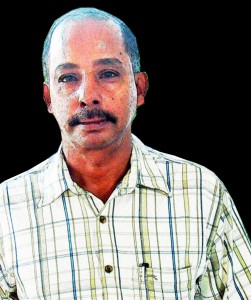 Much has been said about Pakatan Rakyat’s allegedly declining support among the Indian Malaysians and how it will affect Pakatan’s political standing. Ipoh Barat Member of Parliament and DAP national vice chairman M.Kulasegaran shares his views on the issues concerning the Indian community, the steps needed to stem the slide and Perak DAP’s chances in the coming general elections.
Much has been said about Pakatan Rakyat’s allegedly declining support among the Indian Malaysians and how it will affect Pakatan’s political standing. Ipoh Barat Member of Parliament and DAP national vice chairman M.Kulasegaran shares his views on the issues concerning the Indian community, the steps needed to stem the slide and Perak DAP’s chances in the coming general elections.
In your assessment what is the current political climate for the Indian community like? Are they as receptive to Pakatan as in 2008?
By the time of the 2008 general elections (GE) the Indian community’s anger at Barisan Nasional (BN) had reached a boiling point. In the past it was very difficult to get many votes from the Indians; the 2008 political tsunami changed that, perhaps forever. Overnight the Indians’ expectation rose in believing that their community issues would be magically resolved by the Pakatan Rakyat (PR) state governments.
We alluded that PR needed time to remedy the 50 over years of BN’s political mismanagement of the Indian community issues. But many Indians asked “Why need more time? You have the power to do it now!” Together with BN’s unscrupulous spinning of the Kg Buah Pala squatter relocation issue in Penang, PR lost some support from the Indians, post 2008 GE.
However with the unfolding of recent political events and our persistent efforts to engage them, it has somewhat slow that decline in support. We highlighted to them that the short-lived Perak PR state government brought many changes such as in civil servant appointments where more Indians were hired, granting of agricultural land for Indians to work on and land for Tamil schools. The fact that there is an Indian state assembly speaker and deputy chief minister in Perak and Penang speaks of our commitment to be inclusive in power-sharing amongst all the races.
Though many of the past by-elections have indicated of the erosion of Indian community’s support for PR, we should keep in mind that the by-election results are not indicative of how the GE will turn out for us. The by-elections usually favour the ruling party as they are able to use financial means to strongly influence the electorate voting choice.
Can you describe some of the pressing issues that the Indian community faces in Malaysia?
Many of the Indian issues, like other marginalised communities, are economically related; issues such as education, housing, employment and income generation opportunities come to mind. Today the Indian community has achieved some rather unflattering superlatives in the country amongst all the races: the lowest life expectancy, highest school dropout rate, highest incidences of alcoholism and drug addiction, highest number of prisoners in proportion to population and highest suicide rates.
After 54 years of independence, the Indians remain the second poorest community in Malaysia. Why has the present solutions failed? What can be done to remedy it?
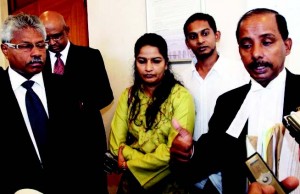 We have to empower the Indian community, to enable them to be economically independent. As many of them are involved in agricultural pursuits, we have to look at providing them the land and seed money for agricultural businesses. This could be a head start for them to lift themselves out of poverty.
We have to empower the Indian community, to enable them to be economically independent. As many of them are involved in agricultural pursuits, we have to look at providing them the land and seed money for agricultural businesses. This could be a head start for them to lift themselves out of poverty.
Unfortunately the BN government have for so many decades neglected to help the Indians in tangible and effective ways. Indian rubber tappers are denied the opportunities to own their small holding estate, cattle and goat rearers not assisted with barns and stables to house the animals, deteriorating Tamil schools infrastructure and amenities, top Indian SPM and STPM scorers failing to get scholarships; the list goes on.
Though the PR state governments are limited in their powers, we have helped in some ways. The Perak PR state government were on the verge of providing several hundred acres of agricultural land for the Indian communities before being toppled unconstitutionally.
How does PR address the accusations from some ex-HINDRAF leaders that PR, having benefited from the Indians’ support in 2008, has failed to deliver on its promises to the Indians?
It must be acknowledged that the HINDRAF movement did galvanise and epitomise the Indian community political awakening. Thanks to the HINDRAF movement, the Hindu temples issue in the country nowadays are handled more delicately by the all state governments.
However to accuse PR of not delivering on our promises is not fair; four of the major HINDRAF leaders are in DAP and PKR. The Indian community struggle is now being carried out by them as well in PR.
Can you relate about some of the issues involving the Tamil schools and the initiatives you have taken to address the problems faced by the schools?
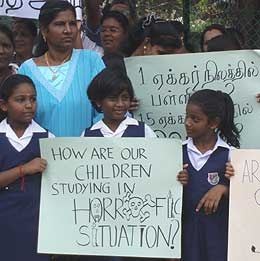 We have over 500 Tamil schools in the country, vastly reduced from pre-Merdeka days. Yet the potential number of Tamil school-going children population has increased substantially.
We have over 500 Tamil schools in the country, vastly reduced from pre-Merdeka days. Yet the potential number of Tamil school-going children population has increased substantially.
Many of these schools are in rural areas and in decrepit conditions; the majority of the Indians are now living in urban areas. The rural Tamil schools are losing students and are facing the danger of foreclosure while the urban ones are bursting to the seams with new student entrants every year. There is clearly a mismatch of education demand; we need to relocate these schools to the urban areas.
Additionally we have almost 9,000 teachers in Tamil schools; with the danger of the rural Tamil schools foreclosure, around 4,000 teachers may be unemployed. However we have no clear plan and serious efforts being made to address the Tamil schools issue.
In July, I organised a roundtable discussion amongst BN, PR and Indian NGO representatives to discuss and issue proposals for the Tamil schools issue. We are engaging bipartisan and broad society support to make it successful.
Some people have considered it trivial that the issue of the Interlok textbook is taking public attention. How do you answer to that?
I would liken the Interlok textbook to the National Bureau of Administration (BTN) indoctrination programmes. We are upset with the BTN racialist indoctrinations of supremacy of a certain race, and rightly so; Interlok is an extension of these racialist indoctrination efforts now imposed upon our children.
Many do not know that the Interlok textbook contains a lot of derogatory depiction of the Malays, Chinese and Indians. Some of the examples include depicting Indians as not caring for their wives, Chinese selling their daughters to prostitution and Malays being lazy. It also contains a lot of factual inaccuracies.
With so much discrepancies and derogatory terms and depiction used, why should the education ministry continue with its usage in schools, which should emphasise factual accuracy? How helpful will it be to build mutual trust and respect amongst the races?
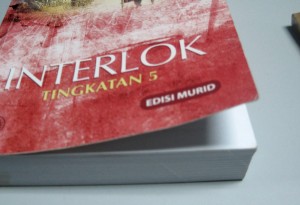 We are not against the author’s right to write the book; however we object to it being use as a reference book for our children in school. It will only poison the minds of the children towards each other.
We are not against the author’s right to write the book; however we object to it being use as a reference book for our children in school. It will only poison the minds of the children towards each other.
The Interlok issue is only one part of a bigger problem, which is the perversion of the truth and fair representation in our educational system. Nowadays history reference books are written to favour a particular religion and race views without adequate representation of other races and religions. We have to continue to highlight this to the public.
Have DAP and Pakatan do enough to arrest the decline in the Indian community support? What more needs to be done?
We have to emphasise to the Indians that changes take time. The state government’s scope of power is limited; much of the financial resources and power in the country are controlled by the federal government, with the state governments getting crumbs from the government’s budget allocation. We also have to deal with the state council civil servants who are still pro-BN; as an example, during the first intake of new civil servants in Ipoh in May 2008, only six out of 77 new positions were filled by Indians, despite directives from the state exco to revamp the hiring practices.
It is not that PR has not addressed the Indian issues; even as opposition now we have continue to play our role in fighting for the people’s plight. A recent example concerns the Dinding Indian association land issue. This piece of land, which has historical significance to the Indian community of Malaysia, was to be forcefully annexed by the Perak state government and developed by BN cronies.
The state government, under the pretence of building a school for the people, attempted to claim the land for development. It is a piece of prime real estate, situated in a strategic part of Sitiawan, which is a booming town in Perak. Together with Indian community there, we took the issue to the courts and managed to force the state government to rescind their acquisition plans. (refer annexe box for further reading).
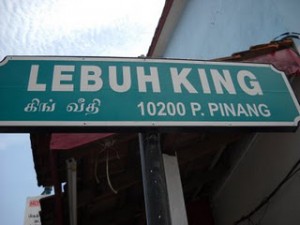 Another example is the recognition of the Tamil language significance; in Penang, we now have road signs in Tamil which was never implemented for over 50 years before. In Perak, when PR was in power, we had an Indian local council president. These changes may seem symbolic but it is a giant leap for us considering the racial suppression that is in existence in this country. We just need to put that in perspective for the Indian community.
Another example is the recognition of the Tamil language significance; in Penang, we now have road signs in Tamil which was never implemented for over 50 years before. In Perak, when PR was in power, we had an Indian local council president. These changes may seem symbolic but it is a giant leap for us considering the racial suppression that is in existence in this country. We just need to put that in perspective for the Indian community.
Admittedly PR needs to step up its efforts to reach out to the Indian community with more Indian-orientated programs. This is a collective effort required of everyone; non-Indian elected representatives have to shoulder these outreach efforts together.
Also, the PR state governments should strive to make more effort to highlight the Indian community’s contribution to society. Having more Tamil road signs in majority Indian areas and more top civil post appointments for qualified Indians based on meritocracy would be some of the obvious steps to be taken.
What can DAP do to enhance its appeal amongst the Indians?
In the past DAP faced much constraint in penetrating the Indian areas. It was not because the DAP leadership had neglected them; the parochial and communal mindset amongst the Indians limited our appeal to them. In the Teluk Intan 1997 by-election where I was the candidate, I was even barred from campaigning in the Indian estate areas by the Indians there. But times have changed; the younger Indians are more receptive to our cause.
As for enhancing our appeal, DAP needs to groom Indian women to be candidates in GE. However we face challenges in this area; the Indian women need to have more awareness of the affairs of the nation.
Also, DAP leaders need to play a more pro-active role in championing Indian-related issues instead of just leaving it to the Indian DAP leaders to take the lead. Indian DAP leaders too must not limit themselves to only look after the Indians in their constituencies.
We can do better in the information dissemination efforts. Many of our DAP elected representatives have substantial number of Indian voters in their constituencies, yet Tamil language Rocket is not actively sold there; this are some of the more visible and workable efforts we need to improve on.
How prepared is Perak DAP to face the coming general elections?
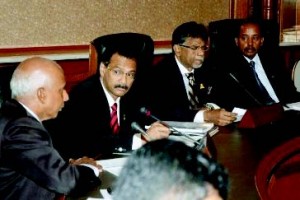 I am optimistic that Perak DAP will do well in the next GE. The challenge is if we can add more to the six parliamentary and 18 state seats we contested and won in the last GE. I have openly asked that DAP be given more seats to contest in the next GE as we have done well in the last GE. I believe it is only logical [for DAP to have more seats to contest] as we have been actively campaigning since 2009 and have been on the ground more than others.
I am optimistic that Perak DAP will do well in the next GE. The challenge is if we can add more to the six parliamentary and 18 state seats we contested and won in the last GE. I have openly asked that DAP be given more seats to contest in the next GE as we have done well in the last GE. I believe it is only logical [for DAP to have more seats to contest] as we have been actively campaigning since 2009 and have been on the ground more than others.
We want our PR partner parties to do better as well. Since we are somewhat more prepared than the others and if winning is the primary factor for consideration, the PR leadership should seriously look into this matter.
Another consideration for DAP to take up is to venture outside its traditional area of strength, notably the Malay-majority and rural seats. We have to look into the possibility of fielding Malay and Orang Asli candidates in the next coming GE in order to bolster our multi-racial appeal.
In regards to Perak DAP, it has been in news for the unsavoury reason of factional rivalry and rift. What should the affected leaders do in order to dispel this rift?
Certainly public perception of our image can be improve; some of our supporters may be a little more “enthusiastic” in their voicing their opinions. Time will allow us to mature politically.
Despite what is being said about this infighting, I have to state that we in Perak DAP are working well together. Ngeh Koo Ham (Perak DAP chairman) and I are together brothers in this political struggle. We sometimes may not see eye to eye on certain matters, and that is normal in politics.
However, we are clear on the fact that our common enemy is BN; it is the number one enemy for everyone in this country. For me my party comes first, everything else is second. I am willing to do all it takes to finish off UMNO-BN hegemony. – The Rocket



